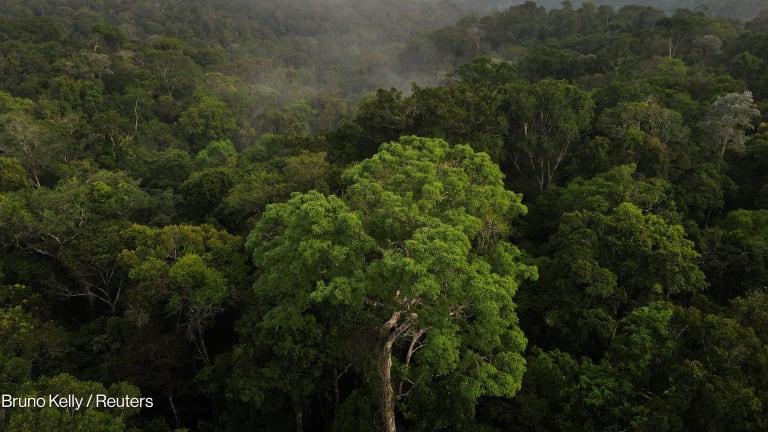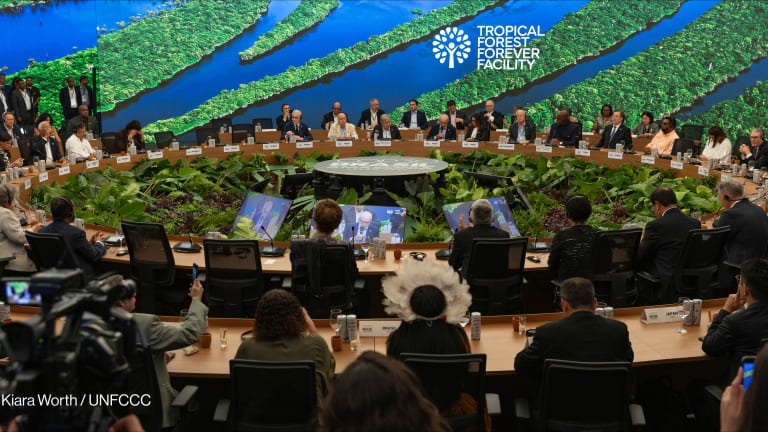
WASHINGTON — The World Bank on Tuesday announced a financing package worth up to $12 billion, aimed at supporting countries in their response to the novel coronavirus outbreak.
The funding will be used “to respond to country requests for crisis financing of their immediate needs and also to lessen the tragic impacts of the virus,” World Bank President David Malpass told reporters.
The announcement includes a combination of new and reprioritized funding.
“Countries face different levels of risk and vulnerability and will require different types of assistance and levels of financial support. So flexibility and responsiveness will be crucial.”
— David Malpass, president, World BankIt will be made available from three branches of the World Bank Group — with $2.7 billion in new financing from the International Bank for Reconstruction and Development, $1.3 billion from the International Development Association, and another $2 billion drawn from the bank’s existing lending portfolio. The International Finance Corp., the bank’s private sector arm, will contribute $6 billion, which includes $2 billion from existing trade facilities.
“The goal is to provide fast, effective action that responds to country needs. It should recognize the extra burden on poorer countries and also the benefit on global public goods from a comprehensive response worldwide by reducing the spread of pathogens,” Malpass said.
World Bank pandemic facility 'an embarrassing mistake,' says former chief economist
Former senior World Bank officials share their views on what Malpass should prioritize at the World Bank.
“There are scenarios where much more resources may be required. We'll adapt our approach and resources as needed,” he added.
The bank hopes that the additional support will enable countries to detect when the virus crosses their borders, mobilize frontline resources to respond, and build preparedness for disease outbreaks, said Muhammad Pate, the bank’s global director for health, nutrition, and population.
“Based on the requests we've already seen, many of those are equipment to check temperature, reagents to test for the virus, infrastructure, things like quarantine facilities or renovation of existing facilities to deal with the caseload, ambulances, and those kinds of support, as well as community engagement,” said Pate, who previously served as Nigeria’s health minister.
With more than 60 countries now reporting cases of the virus, concerns about what a widespread outbreak would mean for countries with weaker health systems are growing.
“In this effort, countries face different levels of risk and vulnerability and will require different types of assistance and levels of financial support. So flexibility and responsiveness will be crucial,” Malpass said.
The bank has come under fire for other attempts to direct funding to pandemic response measures.
A Pandemic Emergency Financing Facility created in 2017 to help the world’s poorest countries facing pandemic risk has been criticized for not disbursing funding in cases where disease outbreaks would appear to warrant it.
Payouts require an outbreak to cross an international border and to cause at least 20 deaths in two countries. Because of those criteria, it took over a year for the facility to disburse funds for the Ebola outbreak in the eastern Democratic Republic of the Congo, and it has still not released funding for COVID-19.
“We're not the ones that declare ... if the insurance is triggered,” Malpass said on Tuesday.
He added that there has been a misperception that a payout would be triggered if the World Health Organization declared COVID-19 a pandemic, which is also not the case.
“It's possible, if it's triggered ... that money would flow in, let's say in the second quarter of this year and could be used and would be additional to the $12 billion dollars that I was announcing today,” Malpass said.
Asked whether there are any conversations inside the bank about adjusting the financing facility’s model, Malpass added, “I think there needs to be lots more experience and evaluation of the concepts of financial insurance.”
Other global health organizations applauded the bank’s efforts to free up financing for COVID-19 response efforts.
“This is a remarkable and unprecedented move by the World Bank — and one which will make a huge difference to the global response to this already immensely challenging epidemic,” said Jeremy Farrar, director of the U.K.-based charity Wellcome Trust, in a statement.
The funding announcement came on the heels of a decision by the World Bank and International Monetary Fund to hold their Spring Meetings virtually, instead of in person, out of concern for the health impacts of the coronavirus.
World Bank staff call for canceling Spring Meetings — permanently
The World Bank's staff association has called to cancel the meetings, both because of the coronavirus outbreak and because the meetings are "at odds with our environmental goals" and "a massive waste of time and money."
On Monday, the World Bank’s staff association called for the Spring Meetings to be canceled permanently, due to the cost of producing them and the environmental impact associated with nearly 12,000 people assembling in Washington, D.C.
Asked whether he would consider doing away with the in-person meetings beyond this year, Malpass said, “We have two meetings a year and they are sizable affairs. So we'll have to look at the experience with the virtual meeting and see how it goes.”








